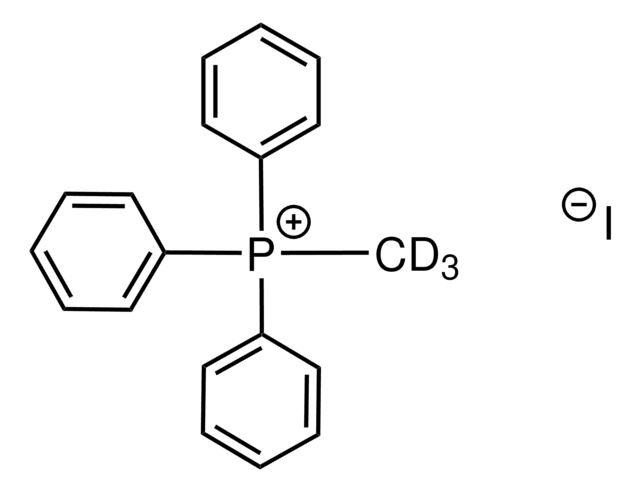176036
Iodomethane-d3
≥99.5 atom % D, ≥99% (CP), contains copper as stabilizer
Sinónimos:
Deuterated iodomethane, Methyl-d3 Iodide
About This Item
Productos recomendados
vapor density
4.89 (vs air)
vapor pressure
22.76 psi ( 55 °C)
6.61 psi ( 20 °C)
isotopic purity
≥99.5 atom % D
assay
≥99% (CP)
form
liquid
contains
copper as stabilizer
refractive index
n20/D 1.5262 (lit.)
bp
42 °C (lit.)
mp
−66.5 °C (lit.)
density
2.329 g/mL at 25 °C
application(s)
environmental
mass shift
M+3
storage temp.
2-8°C
SMILES string
[2H]C([2H])([2H])I
InChI
1S/CH3I/c1-2/h1H3/i1D3
InChI key
INQOMBQAUSQDDS-FIBGUPNXSA-N
¿Está buscando productos similares? Visita Guía de comparación de productos
General description
Packaging
For use with
signalword
Danger
Hazard Classifications
Acute Tox. 3 Inhalation - Acute Tox. 3 Oral - Acute Tox. 4 Dermal - Aquatic Acute 1 - Aquatic Chronic 1 - Carc. 2 - Eye Irrit. 2 - Skin Irrit. 2 - STOT SE 3
target_organs
Respiratory system
Storage Class
6.1B - Non-combustible acute toxic Cat. 1 and 2 / very toxic hazardous materials
wgk_germany
WGK 3
flash_point_f
Not applicable
flash_point_c
Not applicable
Certificados de análisis (COA)
Busque Certificados de análisis (COA) introduciendo el número de lote del producto. Los números de lote se encuentran en la etiqueta del producto después de las palabras «Lot» o «Batch»
¿Ya tiene este producto?
Encuentre la documentación para los productos que ha comprado recientemente en la Biblioteca de documentos.
Los clientes también vieron
Nuestro equipo de científicos tiene experiencia en todas las áreas de investigación: Ciencias de la vida, Ciencia de los materiales, Síntesis química, Cromatografía, Analítica y muchas otras.
Póngase en contacto con el Servicio técnico














